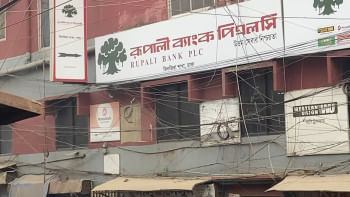AIIB bullish on Bangladesh

Bangladesh is progressively becoming one of the more important countries for the Asian Infrastructure Investment Bank, with the China-led multilateral lender looking to bankroll energy and transport projects in the country.
"We are very bullish on Bangladesh," Dong-ik Lee, director general of investment operations of the AIIB, told The Daily Star in a brief interview yesterday on the eve of the multilateral lender's third annual conference.
It is one of the fastest growing economies in the world, the political situation has stabilised and the macroeconomic growth is good, he said.
The country is of particular interest to the AIIB as it is at an inflection point of social and economic development; a helping hand in ramping up its infrastructure would allow Bangladesh to comfortably set sail for the next stage.
And addressing infrastructure funding gap in a "lean, clean and green" way to enable sustainable economic development in the Asia region is the newest multilateral lender's modus operandi.
Since the AIIB does not lend on concessionary terms, its significance to Bangladesh is expected to grow once the country enters the competitive lending market with its recent admission to the middle-income bracket.
"That's a very good sign -- you're moving in the right direction. You have changed the way outsiders look at Bangladesh."
Since it began operations in January 2016, the AIIB has piped in a total of $285 million on three projects in Bangladesh.
The first project it approved for the country was the construction of a greenfield 220-megawatt dual fuel power plant in Bhola. The AIIB will provide $60 million for the project.
Dong-ik is particularly satisfied with its progress, terming it as one of the successful projects for the AIIB. Construction work has already begun and combined cycle commercial operation is expected to begin by December next year.
Another $60 million is going towards improving the efficiency in gas production in Titas Gas Field and expanding gas transmission pipeline capacity between Chittagong and Bakhrabad.
The AIIB also approved a loan of $165 million to enhance power distribution capacity and increase the number of rural and urban electricity consumers in Bangladesh. Upon completion, the project is expected to benefit about 12.5 million people in rural areas.
Next to get the financing green light from the AIIB board would be a $270 million-project to increase access to safe water supply and sanitation services to selected pourashavas and to strengthen the pourashavas' institutional capabilities for delivering improved water supply and sanitation services.
Of the total project cost, the AIIB will provide $130 million, the World Bank $130 million and the government the remaining $10 million.
The AIIB though has no upper limit to what it wants to pump into Bangladesh. At present, the AIIB's biggest borrower is India, which has taken $1.2 billion thus far.
"So, there is ample room for Bangladesh. There are many good opportunities for us there and there are no downside risks," Dong-ik added.
As many as eight projects have been submitted to the AIIB for consideration, said Economic Relations Division Secretary Kazi Shofiqul Azam, who is leading the Bangladesh delegation in the three-day conference.
"AIIB is not an alternative to the World Bank, the Asian Development Bank and the other bilateral donors. It fills in the gap in financing needs," said Azam, who will be discussing the merits of the projects with the AIIB top brass at the Indian financial capital.
At the three-day conference, finance ministers or the next high ranking officials of the AIIB's 86 member countries will be involved in taking decisions that affect the bank over the next couple of years, said Sir Danny Alexander, its vice president and corporate secretary, in a press briefing yesterday to announce the start of the event.
India was chosen as the venue for the third annual meeting of the Beijing-based multilateral development bank as it is the second largest contributor of capital (8.72 percent) and the largest recipient of its financing -- and was an active participant in the founding of the AIIB, he said.
The previous annual meeting was held in South Korea, and the first one was in Beijing.
Often accused of being an arm of Chinese government policy, especially Chinese President Xi Jinping's Belt and Road Initiative, due to China's disproportionate share in the bank (31.02 percent) as opposed to other members, Sir Danny dismissed the charges once and for all.
"It is an international institution, it is a multilateral development bank. It is the bank of all the member countries. It is as much an Indian bank as it is a Chinese bank or a British bank."
It operates based on rules and no project will get financing from the AIIB unless it meets all the parameters agreed by the member countries and discussed by the board of government, he added.
"AIIB might be as Chinese a bank as the World Bank is American," said India's Economic Affairs Secretary Subhash Chandra Garg.
No project has so far been funded on the Belt and Road Initiative by the AIIB, he added.
In the two-and-a-half years in which the bank has been in operation, it has lent out $4.4 billion to 25 projects in the Indian subcontinent, Myanmar, China, Oman, Philippines, Indonesia, Egypt, Tajikistan, Georgia and Azerbaijan.
The bank started out with 57 members, including France, Italy, Germany and the UK. Of the Group of Seven countries, only Japan and the US are not members.
Its capital base stands at $100 billion, with 20 percent assigned to paid-up capital.


 For all latest news, follow The Daily Star's Google News channel.
For all latest news, follow The Daily Star's Google News channel. 



Comments